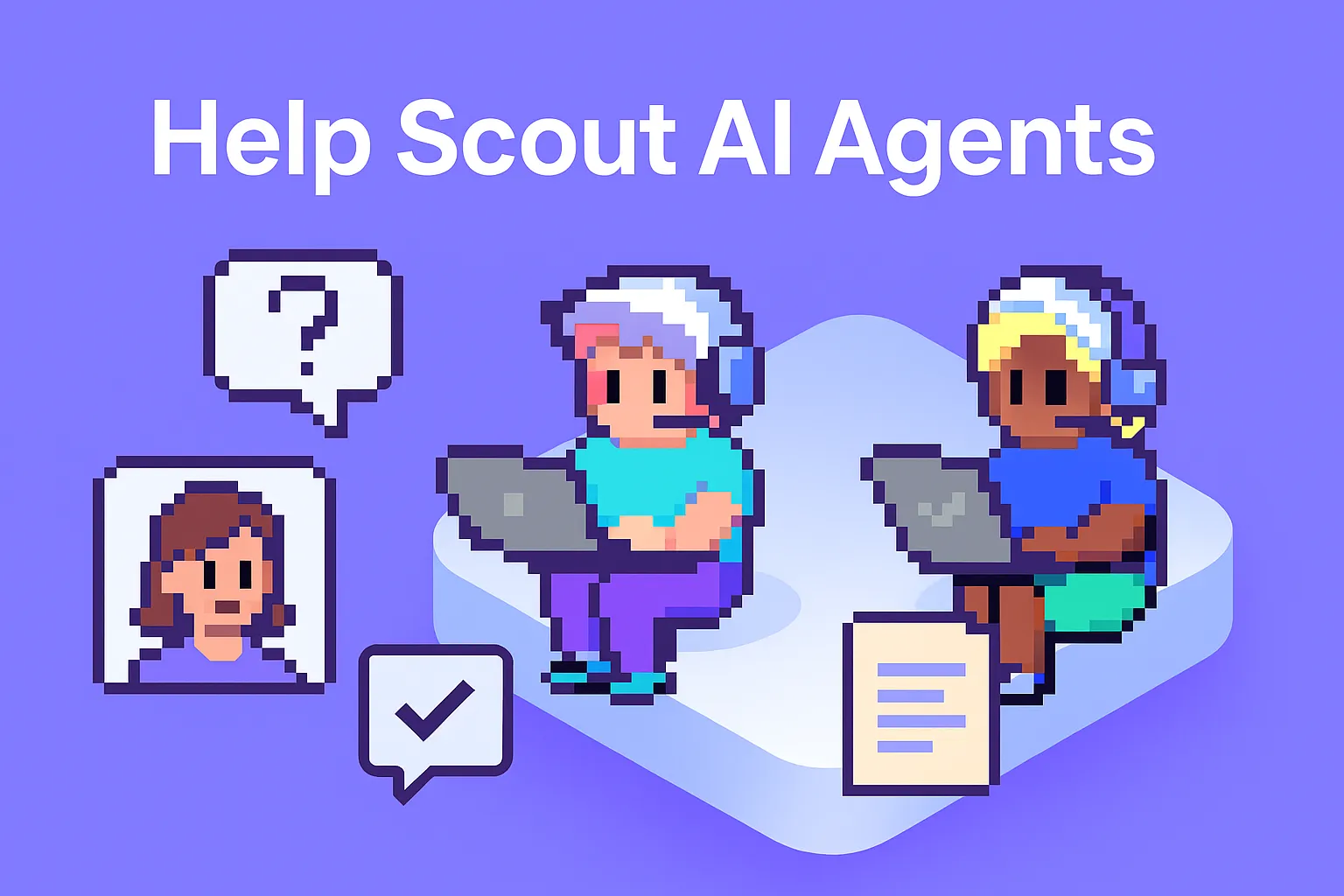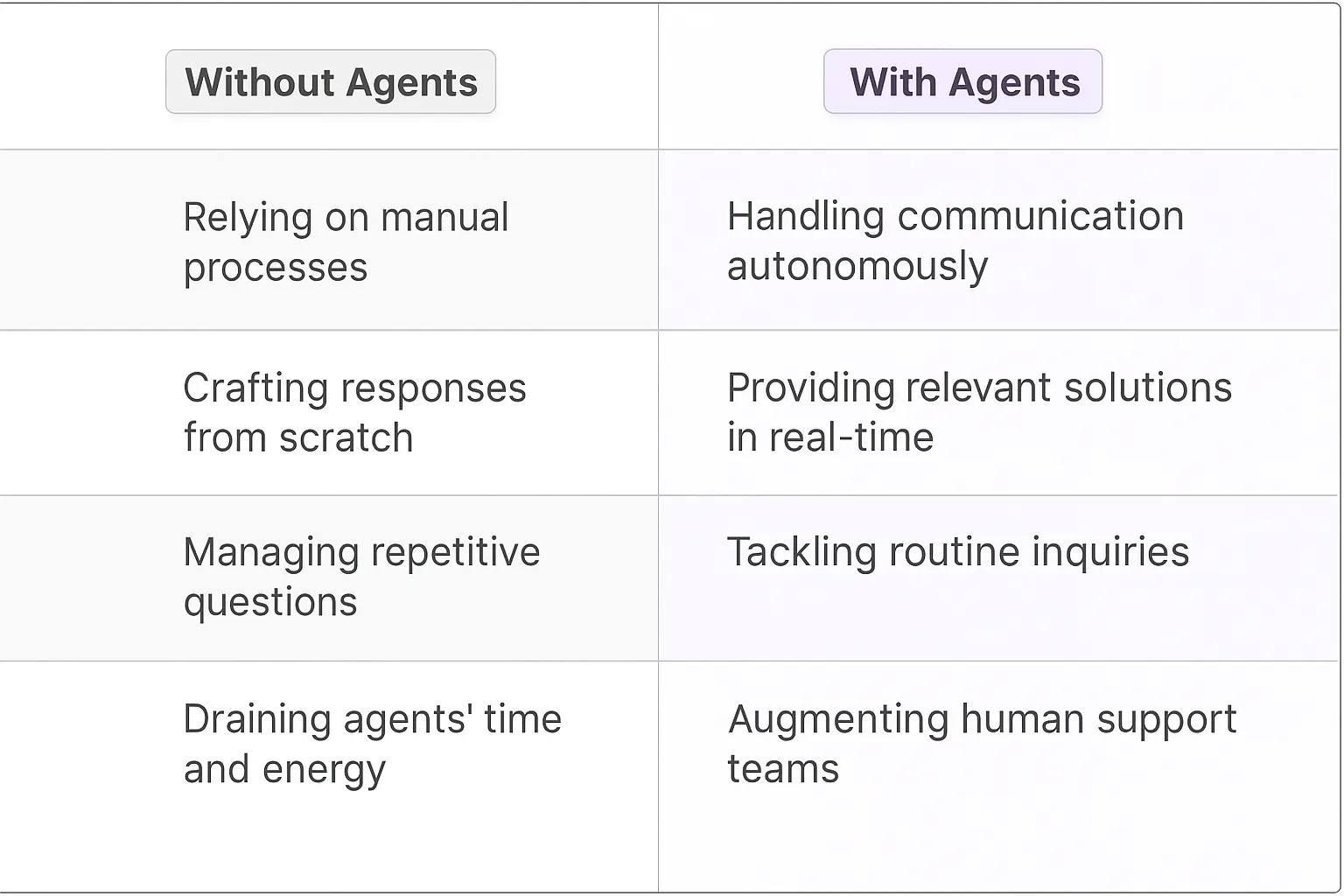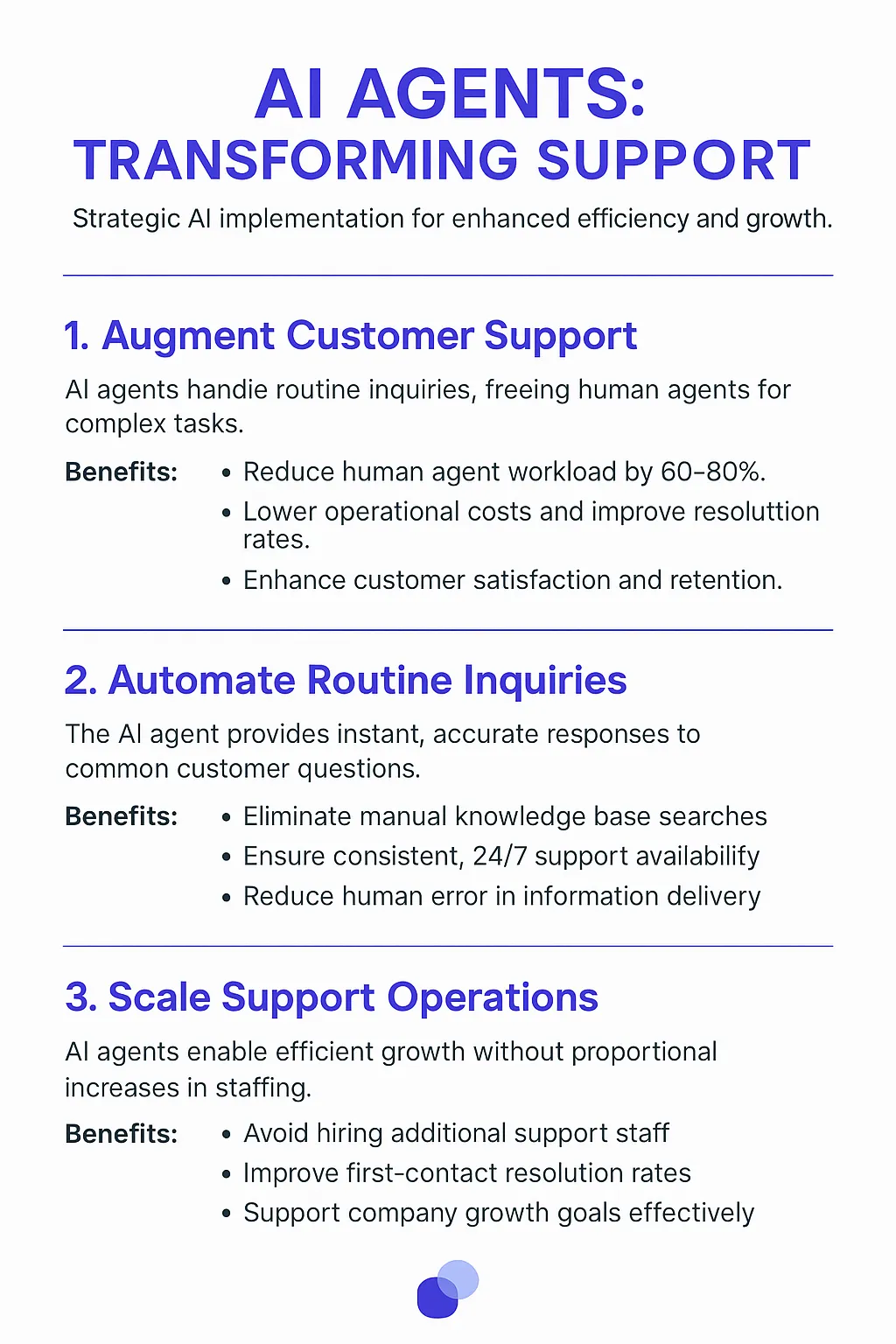Help Scout
Understanding Help Scout's Customer Service Platform
What is Help Scout?
Help Scout is a customer service platform that powers support operations for thousands of businesses worldwide. The platform combines shared inbox functionality, knowledge base tools, and customer data management to create a unified support experience. Unlike traditional help desk software that treats customers like ticket numbers, Help Scout maintains a personal approach to customer communication.
Key Features of Help Scout
The platform's core strengths include collaborative inbox management, where teams can work together seamlessly on customer conversations. Its knowledge base system, called Docs, enables companies to create self-service support content. Help Scout's reporting tools provide deep insights into team performance and customer satisfaction metrics. The platform also offers native integrations with popular business tools and a robust API for custom implementations.

Benefits of AI Agents for Help Scout
What would have been used before AI Agents?
Customer support teams using Help Scout traditionally relied on manual processes, canned responses, and knowledge base articles to handle customer inquiries. Support agents spent significant time searching through documentation, crafting responses from scratch, and managing repetitive questions that drained their creative energy and problem-solving capacity.
What are the benefits of AI Agents?
AI Agents transform Help Scout's support ecosystem by operating as digital teammates who handle the heavy lifting of customer communication. They analyze incoming messages in real-time, understanding context and intent to provide relevant solutions.
The most compelling benefit is how AI Agents augment human support teams rather than replace them. They tackle routine inquiries about pricing, feature functionality, and common troubleshooting, allowing human agents to focus on complex problem-solving and building meaningful customer relationships.
These digital teammates excel at pattern recognition across thousands of support conversations. They identify trending issues before they become widespread problems and suggest proactive solutions. This creates a feedback loop that continuously improves the quality of support.
For scaling companies, AI Agents in Help Scout effectively eliminate the traditional correlation between customer growth and support team size. They handle increasing ticket volume while maintaining consistent response quality and speed. The system gets smarter over time, learning from each interaction to provide more accurate and nuanced responses.
The ROI manifests in multiple ways: reduced response times, increased first-contact resolution rates, and higher customer satisfaction scores. Support teams report feeling more fulfilled as they can dedicate their energy to challenging cases that require human empathy and creative problem-solving.

Potential Use Cases of AI Agents with Help Scout
Customer Support Enhancement
AI Agents integrate seamlessly with Help Scout's customer service platform to handle routine inquiries and support tasks. They can analyze incoming customer messages, categorize issues, and draft personalized responses based on previous successful interactions. This allows human support teams to focus on complex problems requiring empathy and nuanced understanding.
Knowledge Base Optimization
Digital teammates continuously analyze support conversations to identify knowledge gaps in documentation. They suggest new articles, update existing content, and ensure help docs stay current with customer needs. The AI can detect trending issues and automatically propose relevant documentation updates.
Smart Ticket Routing
AI Agents examine ticket content and customer history to intelligently route conversations to the most qualified team member. They factor in agent expertise, workload, time zones, and past interaction success rates to optimize ticket distribution.
Proactive Customer Communication
The AI monitors customer behavior patterns and engagement metrics to identify opportunities for proactive outreach. When users struggle with specific features or show signs of confusion, the system can trigger targeted help resources or prompt human agents to reach out.
Performance Analytics
Digital teammates analyze support metrics to uncover actionable insights about team performance, customer satisfaction trends, and operational efficiency. They generate detailed reports highlighting areas for improvement and suggesting data-driven optimizations. Performance Analytics capabilities enable teams to make informed decisions about resource allocation and process improvements.
Automated Follow-ups
AI Agents handle post-resolution follow-ups by checking in with customers, gathering feedback, and ensuring issues stay resolved. They can detect when similar problems resurface and alert the support team to potential systemic issues.
Customer Sentiment Analysis
The AI continuously monitors conversation tone and customer sentiment across all support channels. This helps identify at-risk accounts and enables timely intervention by human agents before problems escalate.
Training Support
Digital teammates assist in onboarding new support team members by providing real-time guidance, suggesting relevant resources, and offering feedback on draft responses. They help maintain consistency in support quality while accelerating the learning curve for new hires.

Industry Use Cases
AI agents in Help Scout transform how businesses handle customer interactions across multiple sectors. The integration creates a powerful combination of human expertise and AI capabilities that elevates customer support beyond traditional boundaries. These digital teammates analyze patterns, learn from interactions, and adapt their responses based on specific industry contexts.
The real power lies in how these AI agents handle industry-specific challenges. From e-commerce companies managing high-volume seasonal spikes to SaaS businesses tackling technical support inquiries, the applications are both diverse and impactful. What makes this particularly interesting is how the AI adapts its communication style and problem-solving approach based on the industry context.
Looking at actual implementations, we're seeing companies reduce their response times by 60-70% while maintaining or improving customer satisfaction scores. This isn't just about automation - it's about creating more meaningful customer interactions that drive business growth and foster long-term relationships.
The following industry examples demonstrate how Help Scout's AI agents address unique challenges and create tangible value in different business environments. Each case represents a distinct way these digital teammates enhance customer support operations while maintaining the human touch that customers appreciate.
E-commerce Support: Scaling Customer Service Without Sacrificing Quality
E-commerce businesses face a critical challenge: maintaining personalized customer support while handling exponentially growing ticket volumes. The economics of online retail demand keeping support costs low while still delivering high-touch service that drives repeat purchases.
Help Scout AI Agents transform this equation by functioning as digital teammates that augment human support teams. For online retailers, these AI Agents excel at handling the most common customer inquiries that typically consume 40-60% of support bandwidth: order status checks, return initiation, and basic product questions.
Take a mid-sized fashion retailer processing 1,000 support tickets daily. By deploying Help Scout AI Agents to manage routine inquiries, human agents can focus on complex issues requiring empathy and judgment - like sensitive customer complaints or VIP client requests. The AI handles straightforward tasks with consistent accuracy, accessing order systems to provide real-time shipping updates and processing return labels according to policy.
The network effects are powerful: as the AI handles more interactions, it builds a deeper understanding of customer needs and common resolution paths. This creates a flywheel where service quality improves while costs decrease. One online retailer saw their first-response time drop from 4 hours to 12 minutes after implementing AI Agents, while maintaining a 94% customer satisfaction rating.
For e-commerce businesses hitting scale, Help Scout AI Agents provide the infrastructure to deliver enterprise-grade support without enterprise-level headcount. The technology enables support teams to maintain quality while expanding coverage to nights and weekends - critical for online retail where customers expect 24/7 availability.
SaaS Support: Turning Product Complexity into Customer Success
SaaS companies face a unique support challenge - their products often have deep functionality that requires significant customer education and troubleshooting. The traditional approach of scaling support linearly with customer growth quickly breaks down as product complexity increases.
Help Scout AI Agents are particularly effective for SaaS support teams because they can digest vast amounts of product documentation, release notes, and troubleshooting guides. This knowledge foundation allows them to handle technical inquiries with remarkable precision, especially for common issues like API integration questions, feature configurations, and basic debugging.
Consider a B2B analytics platform serving 5,000 customers. Their support team previously struggled with a backlog of basic implementation questions, preventing them from focusing on strategic customer success initiatives. By deploying Help Scout AI Agents, they automated responses to common technical queries, reducing their ticket backlog by 65% within three months.
The AI's ability to understand technical context and provide accurate, detailed responses makes it invaluable for SaaS support. When a customer asks about implementing a specific API endpoint, the AI can provide code snippets, documentation links, and step-by-step instructions - all while maintaining the context of the customer's specific use case.
The most compelling aspect is how AI Agents enhance the product feedback loop. By analyzing support interactions, they identify patterns in user confusion and technical obstacles, providing valuable insights for product development. One SaaS company discovered that 40% of their support tickets stemmed from unclear documentation around three specific features - leading to targeted improvements that reduced related tickets by 80%.
For SaaS businesses, Help Scout AI Agents transform support from a cost center into a strategic advantage. They create a scalable foundation for customer education and technical assistance, enabling human support teams to focus on high-value activities like customer success planning and complex problem-solving.
Considerations and Challenges
Implementing AI agents in Help Scout requires careful planning and strategic decision-making. The integration process presents several key areas that demand attention before deployment.
Technical Challenges
Data privacy stands as a critical concern when deploying AI agents in Help Scout. Customer service interactions often contain sensitive information, requiring robust encryption and careful handling of data flows between systems. Organizations must establish clear protocols for data retention and implement proper access controls.
API rate limits can create bottlenecks during high-volume periods. Teams need to architect their integration to handle these constraints through intelligent request batching and queue management. Additionally, version compatibility between Help Scout's API and AI models requires ongoing maintenance as both platforms evolve.
Operational Challenges
Training customer service teams to work alongside AI agents demands significant investment. Agents need to understand when to delegate tasks, how to review AI-generated responses, and when human intervention is necessary. This learning curve can temporarily impact response times and team productivity.
Setting appropriate customer expectations proves crucial. Organizations must clearly communicate which interactions involve AI agents versus human agents. Maintaining transparency helps build trust while preventing potential confusion or frustration.
Performance Monitoring
Measuring AI agent effectiveness requires new metrics beyond traditional customer service KPIs. Teams need to track accuracy rates, escalation frequencies, and customer satisfaction specifically for AI-handled interactions. Creating these measurement frameworks takes time and continuous refinement.
Regular audits of AI responses help identify potential biases or gaps in knowledge. Organizations should establish review processes to catch and correct issues before they impact customer experience at scale. Performance Monitoring systems help teams maintain quality standards while scaling AI capabilities.
Cost Management
While AI agents can reduce operational costs, initial implementation expenses can be substantial. Organizations need to budget for integration development, team training, and ongoing API usage fees. Creating a detailed cost-benefit analysis helps set realistic expectations for ROI timelines.
The Future of AI-Enhanced Customer Support
The integration of AI Agents with Help Scout represents a significant advancement in customer support technology. These digital teammates don't just automate tasks - they enhance the entire support ecosystem by learning, adapting, and improving over time. Organizations implementing this technology are seeing tangible benefits: reduced response times, improved team satisfaction, and better customer outcomes.
The key to success lies in thoughtful implementation that maintains the balance between automation and human connection. As AI technology continues to evolve, organizations that master this integration will gain a significant competitive advantage in customer experience delivery.
The future of customer support isn't about choosing between human agents or AI - it's about creating powerful combinations of both. Help Scout's AI Agent integration provides a framework for this future, enabling organizations to scale their support operations while preserving the personal touch that customers value.













